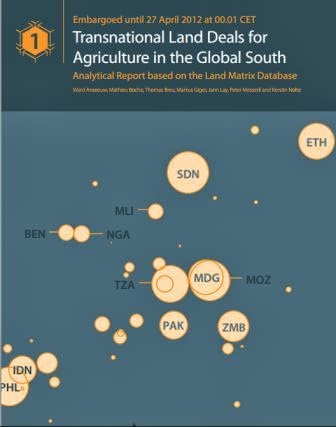5 - 7 March 2014. Stellenbosch (Cape Town). The Food and Agriculture Organization (FAO) of the United Nations, the Institute for Poverty, Land and Agrarian Studies (PLAAS), the Future Agricultures Consortium, and the Land Policy Initiative (LPI) of the African Union, the African Development Bank and the United Nations Economic Commission for Africa, jointly organized this multi-stakeholder conference -
This conference aimed to promote an open exchange of experiences and evidence-based knowledge on the implications of public and private agricultural investments for rural livelihoods, gender relations, social differentiation.
The conference featured research findings by a range of institutions and networks, that document and analyse diverse land-based investments and the related business models, investment partnerships, community impacts and community responses. The purpose was to critically review existing investment practices as well as relevant policy and institutional set-ups in order to identify good and bad practices, promising strategies, approaches and policy measures that can be promoted and adapted to national contexts to foster inclusive, equitable and socially responsible investment that respect the rights of local communities and promote economic growth within a framework of social and gender equality.
The conference analyzed the following thematic areas always with a strong focus on gender and social equity dimensions:
1. Primary agriculture investments implemented under different business models and the implications for the livelihoods of rural women and men
- Value chain participation and small-scale farmer development
- Technology transfer and skills development
- Opportunities and challenges for decent employment creation and income generation
- Changes in land access, use and control
- Free, prior and informed consent
- Changes in intra-household decision-making and resource control
- Infrastructure development and provision of social goods
- Policy, institutional and regulatory frameworks, including national land tenure, agricultural development, trade regulation and investment policy, legislation and related institutions
- Civil society and producers’ organizations best practice, roles and responses
- Private sector best practice, corporate social responsibility and self-regulation
Ghana, Sierra Leone, Tanzania, South Africa, Mozambique, Malawi, Zambia, Kenya, Ethiopia and Uganda are the priority countries but interesting and innovative case studies from other countries were also considered.
Martha Osario of FAO presents the Aims and Objectives of the Multi-Stakeholder Conference Agricultural Investment, Gender and Land in Africa.
Honourable Ambassador Gertrude, a Tanzanian politician and the first president of the Pan-African Parliament, spoke movingly about the subordinate position of women in agricultural development despite the fact that "most African men received an education because their mothers were farmers".
Nidhi Tandon of Oxfam (Canada) at the first day of the Multi-Stakeholder Conference on Agricultural Investment, Gender and Land in Africa, highlighting women's loss of dignity as a result of land deals.
In this presentation, Ward Anseeuw from the University of Pretoria and CIRAD, discusses the Land Matrix research on the extent and impact of agricultural investment. He highlights that agricultural investment is not as pervasive as one would imagine given the media uptake of the issue; nevertheless the impacts on poverty are severe, especially since so many projects have failed.
Even with the data collated by the Land Matrix project, the picture of large-scale land acquisitions remains hard to decipher. But The Land Matrix database provides evidence that the phenomenon may be even larger than assumed until now.
The LAND Matrix (April 2012. 64 pages. Authors: Anseeuw, W.; Boche, M.; Breu, T.; Giger, M.; Lay, J.; Messerli, P.; Nolte, K.) out of which this report was produced, is an online public database of large scale land deals facilitated by a partnership between the following organisations:
- The International Land Coalition (ILC) is a global alliance of civil society and intergovernmental organisations working together to promote secure and equitable access to and control over land for poor women and men through advocacy, dialogue, knowledge sharing and capacity building.
- The Centre for Development and Environment (CDE) is the University of Bern’s centre for sustainable development research.
- CIRAD works with the whole range of developing countries to generate and pass on new knowledge, support agricultural development and fuel the debate on the main global issues concerning agriculture. he GIGA German Institute of Global and Area Studies based in Hamburg-based.
- The Deutsche Gesellschaft für Internationale Zusammenarbeit (GIZ)
)
Discussing trends and responses to agricultural investment, Pascal Liu argues that investment only makes sense if it is going to benefit rural communities.
Sue Mbaya discusses the need for the Voluntary Guidelines on large scale land investments



No comments:
Post a Comment